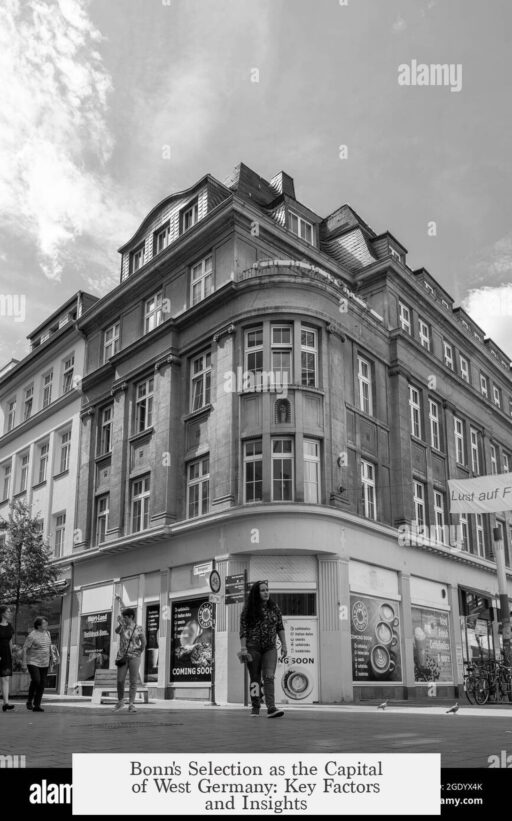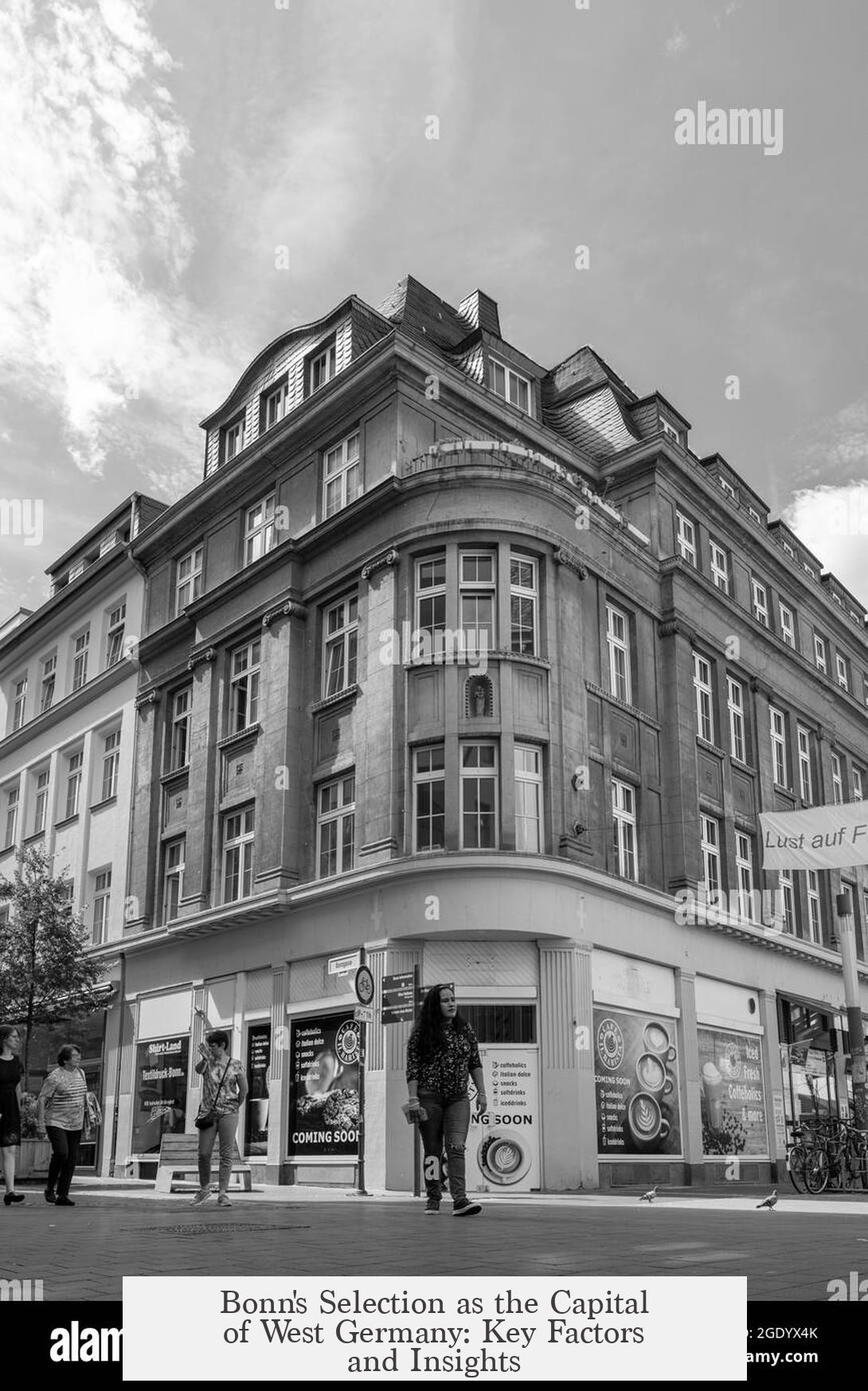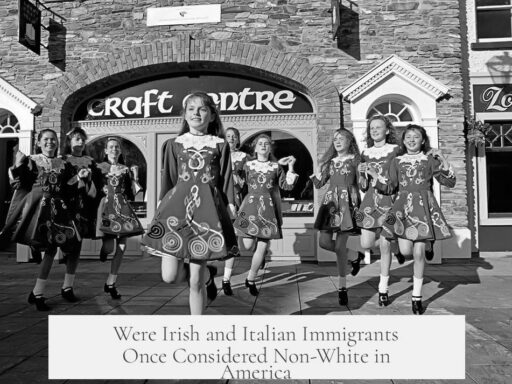Bonn became the capital of West Germany because it balanced several key criteria better than other candidates and was chosen as a provisional capital pending reunification. The choice reflected political, historical, and logistical considerations, with the overriding aim of reinstating Berlin as the capital once Germany reunified.
Berlin’s status as the traditional German capital was undisputed but politically impossible during the Cold War. It lay deep inside East Germany and was divided between East and West sectors. Almost all West German political forces accepted that any capital before reunification could only be temporary. The seat of government was thus termed an “interim” or “provisional” capital, emphasizing that the status would change once Germany became whole again. Carlo Schmid of the SPD notably suggested constructing provisional government buildings near the Inner German border to symbolize this temporary nature.
Choosing a capital city involved strict criteria addressing logistics, symbolism, and political impact. The city needed to be large enough to host government infrastructure and public housing for officials, but not excessively large. The fear existed that selecting a major city could entrench the division and solidify the capital’s provisional status into permanence. Good connections via rail and air were mandatory. Furthermore, the city must not have been severely damaged during World War II to avoid massive reconstruction. Cultural and denominational aspects also mattered: some argued that a city positioned between Catholic and Protestant regions would better reflect German diversity.
Several cities were considered at various stages. Initially, cities like Bamberg were advocated due to their cultural traits, but the competition narrowed considerably to three serious contenders: Kassel, Frankfurt, and Bonn.
- Kassel was quickly eliminated. It had been heavily bombed during the war, ruining much of its infrastructure. Additionally, politicians from Hesse were divided between Kassel and Frankfurt, weakening its political backing.
Frankfurt initially appeared to be the natural choice. It was a large, well-connected city with a rich political history. Frankfurt crowned German emperors for centuries and hosted the first democratically elected pan-German parliament in 1848 at St. Paul’s Church. It was also the headquarters of the American occupation forces, which ensured good infrastructure. However, these points produced conflicting views.
- Many believed Frankfurt’s ties with the Allied military presence made it less suitable for a sovereign West German seat of government.
- There was concern Frankfurt’s prominence might cause the capital status to become permanent, conflicting with the goal of returning the capital to Berlin after reunification.
- The extensive destruction Frankfurt suffered during the war raised apprehensions about reconstruction challenges.
Bonn emerged as the final choice due to several advantages:
- Bonn had sustained comparatively minor damage during World War II, reducing rebuilding needs.
- It was smaller and thus symbolized a temporary rather than permanent capital.
- Bonn already hosted the West German Parliamentary Council, positioning it as a political hub early in the country’s postwar era.
- Its selection was partly due to the balance of occupation zones; previous meetings took place in the American and French zones, making it the British zone’s turn to host this important institution.
- Political support in Bonn was strong enough to overcome Frankfurt’s appeal.
The choices reflected a compromise rather than perfect solution. Bonn was manageable, less controversial, and underscored the temporary nature of West Germany’s government seat. It sent a message that Berlin remained the ultimate destination for a united Germany’s capital. This provisional status remained in effect through 1990, when the capital finally moved back to Berlin after reunification.
| Criteria | Frankfurt | Bonn | Kassel |
|---|---|---|---|
| War Damage | Significantly damaged | Minimally damaged | Heavily damaged |
| Size and Symbolism | Large, historical capital prospect | Smaller, provisional capital symbol | Medium, questionable support |
| Political Support | Strong but conflicted | Strong and stable | Divided |
| Logistical Infrastructure | Excellent, Allied military presence | Good, existing parliamentary council | Poor due to destruction |
| Political Objective | Risk of permanence | Emphasis on temporary capital | Too weak to contend |
Choosing Bonn showcased West Germany’s commitment to future reunification and avoided data pitfalls in Frankfurt, such as Allied presence and historic prominence, which risked lock-in. Bonn’s political importance firmly linked to provisional status and zone balance allowed it to serve as a pragmatic, safe choice.
Key points:
- Bonn was chosen as West Germany’s provisional capital while Berlin remained inaccessible.
- Provisional status was critical; the capital was temporary until reunification occurred.
- Frankfurt was large and well-connected but risked permanent capital status and Allied military interference.
- Bonn was less damaged, smaller, politically viable, and already hosted a parliamentary council.
- The choice reflected desire to balance political, logistical, and symbolic factors.
- After reunification in 1990, Berlin resumed its role as Germany’s capital.
Why was Bonn the Capital of West Germany?
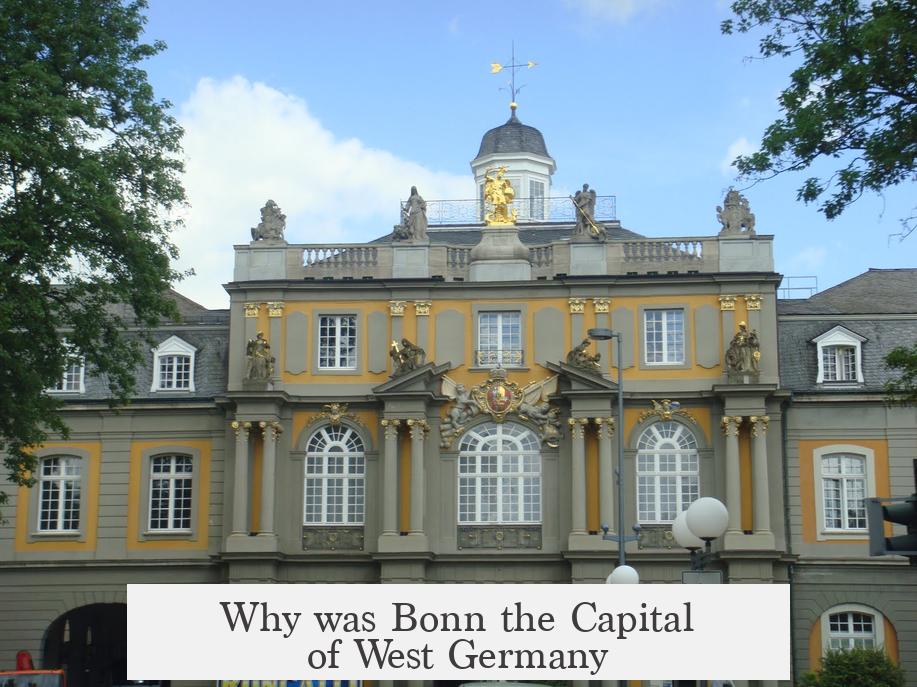
Bonn became the capital of West Germany primarily because it was considered a practical, symbolic, and provisional choice during a very complex period in German history. The decision was far from arbitrary and steeped in political strategy, geography, and the realities of post-war Germany. Let’s unravel the story behind why this relatively small city held the big title of capital in a divided nation.
The Provisional Nature of Bonn as Capital
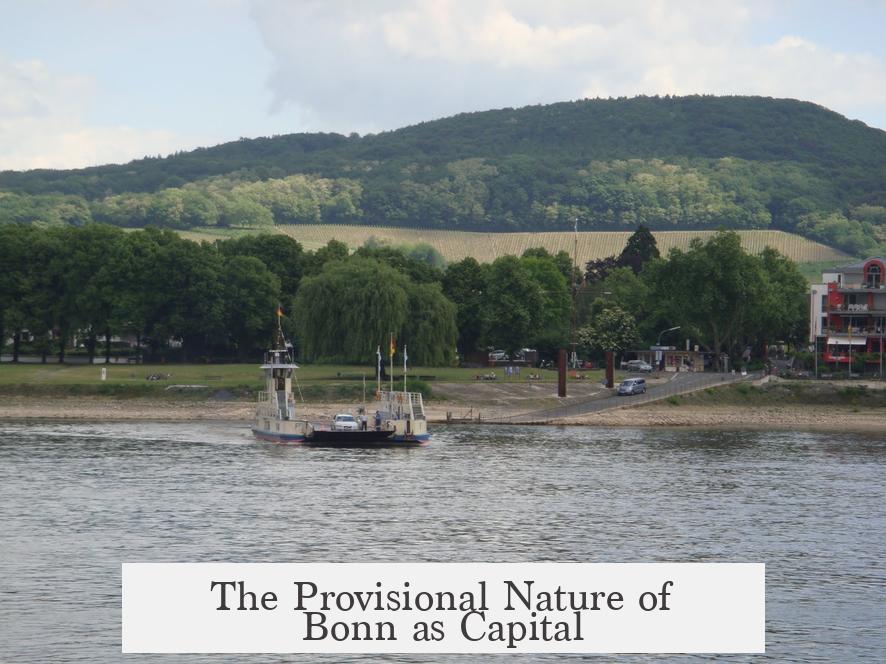
First, it’s crucial to understand that Bonn’s status as capital was never meant to be permanent. The entire political spectrum across West Germany shared a common goal: reunify Germany and return the capital to its historic home, Berlin. So, Bonn was a placeholder, a temporary seat of government while everyone worked toward that reunification.
Imagine the scenario—Berlin, the traditional capital, was locked behind the Iron Curtain. Politically, choosing any other city risked signaling acceptance of permanent division, which nobody in West Germany wanted. Some politicians even suggested building a temporary government center close to the East-West border to highlight this provisional spirit, showing just how serious they were about reunification.
What Made Choosing a Capital So Tricky?
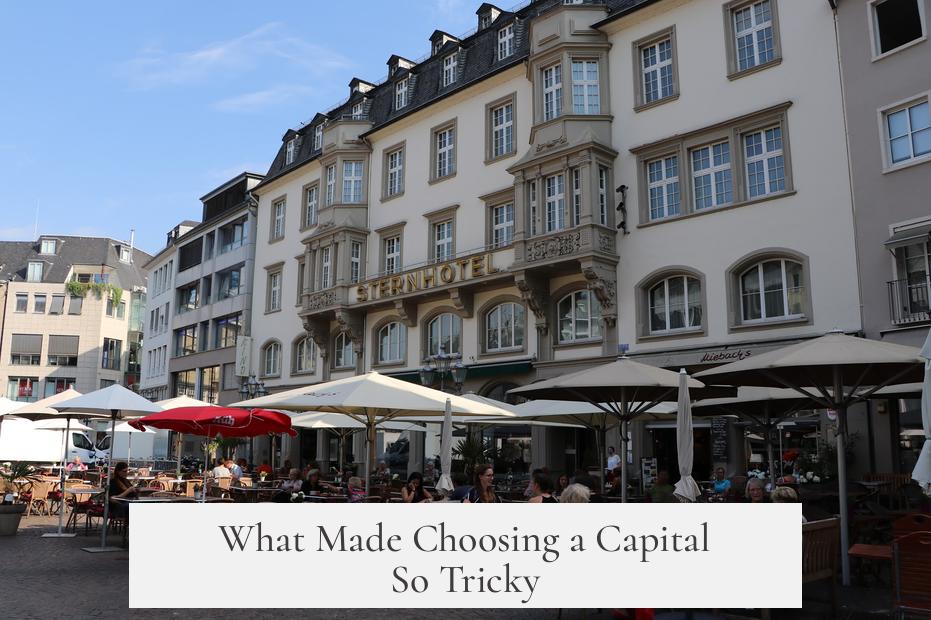
Picking a new capital was like a city selection speed date with a bunch of demanding criteria. The city had to be large enough to handle governmental offices and provide housing for officials. It needed excellent transport links—railways and aviation were essential. Plus, it couldn’t have been devastated by the war to the point where rebuilding was impossible.
Yet, paradoxically, people did not want the capital to be too big. Why? Because there was a genuine fear that an imposing, permanent government seat might solidify the division, making Bonn’s “temporary” status permanent. At the same time, regional and cultural considerations came into the debate. Bamberg, for instance, was championed for its location between Catholic and Lutheran regions, reflecting Germany’s complex cultural landscape.
Who Made the Cut? The Final Candidates
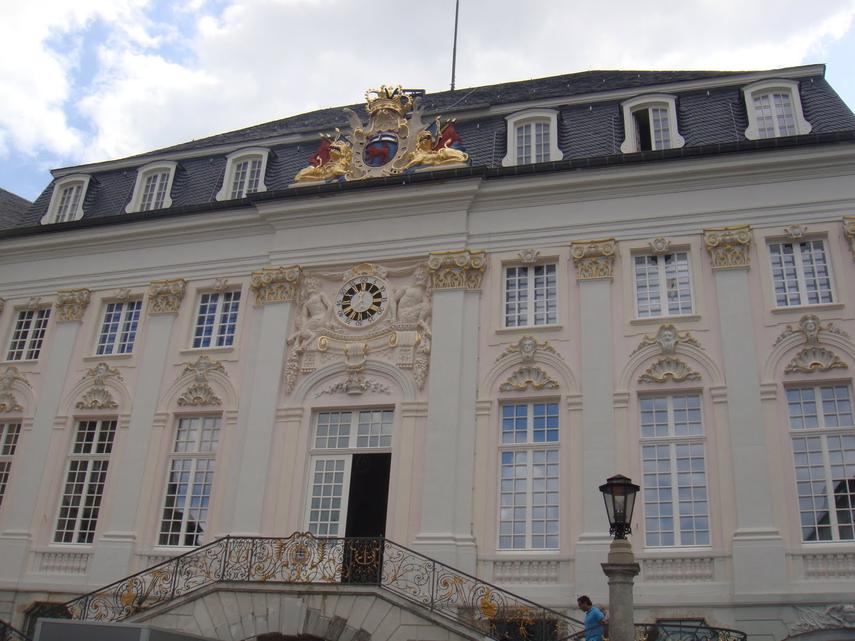
Out of many cities, three stood out as serious contenders: Kassel, Frankfurt, and Bonn. Kassel bowed out early because it was badly bombed, and its political base in Hesse was divided.
Frankfurt seemed a natural fit. Picture this: a big city with historical significance! Frankfurt had been where German emperors were crowned for centuries and was home to the first pan-German democratic parliament in Saint Paul’s Church, nearly a century earlier. Its infrastructure was impressive, and it hosted the American military’s headquarters, which meant good transport connections and a political buzz.
Frankfurt’s High Profile Was a Double-Edged Sword
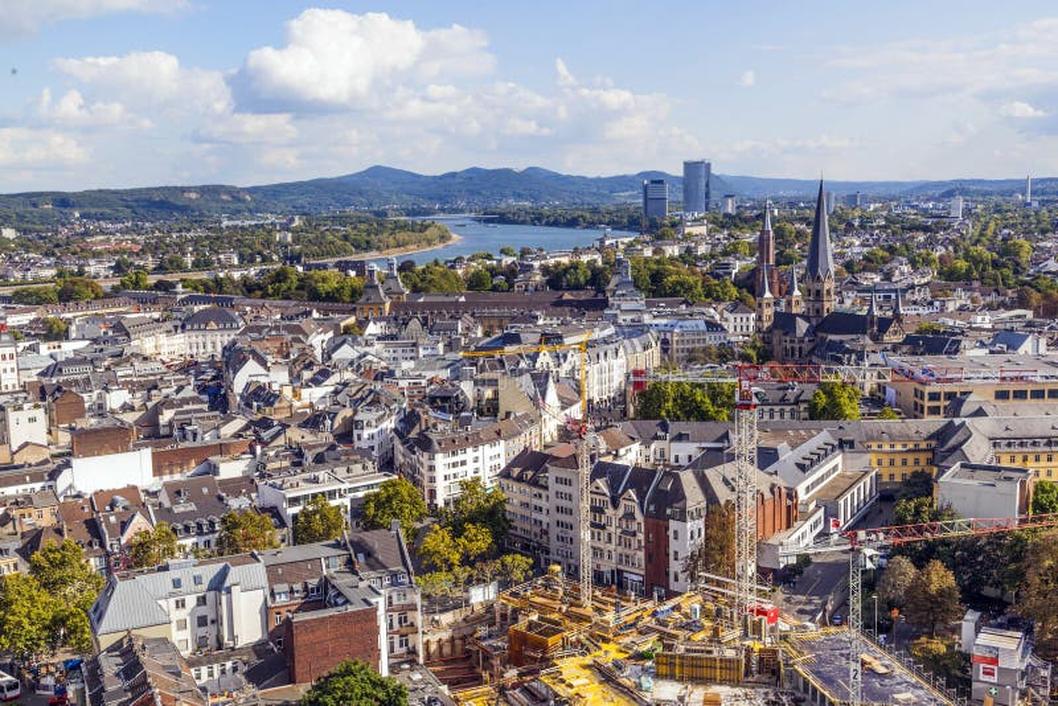
But Frankfurt’s advantages brought some big drawbacks. Hosting an Allied military headquarters made many uneasy—it didn’t quite scream “independent German government.” Also, Frankfurt’s rich history was part of the problem. People worried its selection would turn into a permanent capital post-reunification, contrary to the temporary status West Germany wanted to signal.
These concerns made some politicians uneasy about appointing Frankfurt. The city’s prestige and size were almost too intimidating for a capital meant to scream “just for now.”
Why Bonn Won the Day
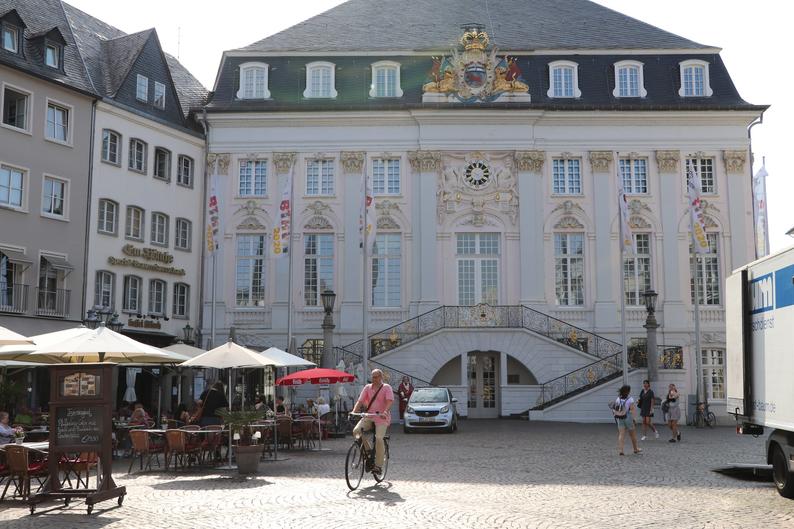
This brings us to the actual winner—Bonn. At first glance, Bonn might seem like a dark horse candidate against the bigger, more prominent cities. However, Bonn had a series of hidden strengths that made it a perfect fit:
- It suffered much less wartime destruction than Frankfurt, so facilities and infrastructure were easier to restore or utilize.
- Bonn was home to the West German Parliamentary Council, the body that drafted the Basic Law, which became West Germany’s constitution. That alone lent Bonn undeniable political weight.
- The city was located in the British zone of occupation, which balanced the American and French zones where important political events had previously occurred. This distribution helped win crucial support.
- Most importantly, Bonn was small, unpretentious, and lacked the baggage of a big imperial city. This made it ideal as a provisional capital, signaling clearly that it was temporary, not permanent.
In a way, Bonn’s size was its crown jewel. It was just big enough to handle government work but modest enough not to hint at permanence.
What Can Modern Readers Learn From This?
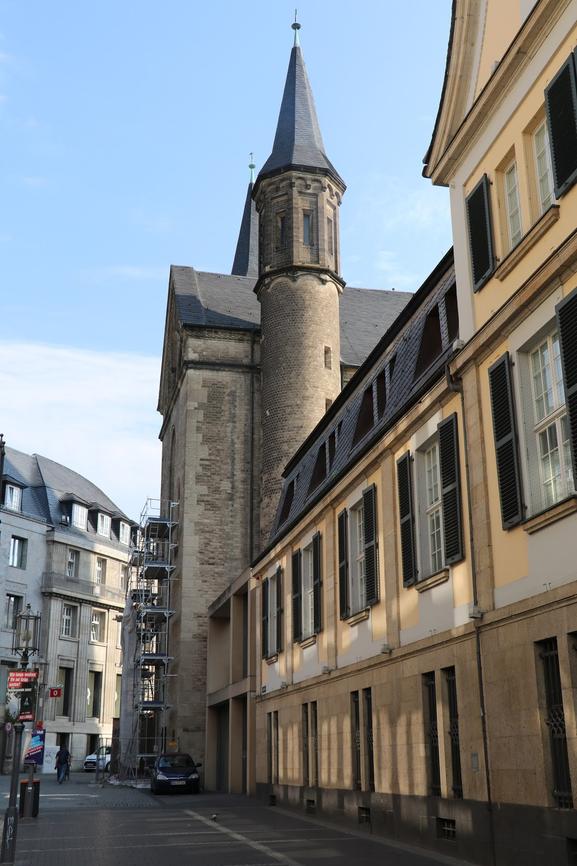
The story of Bonn’s brief capital status offers timeless lessons on compromise, symbolism, and pragmatism. It reminds us that sometimes the best choice is not the obvious one but the one that fits a complex situation like a tailored glove.
Choosing Bonn balanced political realities and symbolism skillfully. While many cities could claim historical grandeur or practicality, Bonn offered the right mix of both without threatening the ultimate goal: reunification and a return to Berlin.
Have you ever had to pick a “temporary” solution hoping for something better down the road? Bonn’s story shows how such decisions can shape history.
In Closing
Bonn was the capital of West Germany as a calculated, provisional choice suited to the country’s divided state, logistical needs, and political aspirations during the Cold War. Its modest size, political neutrality, and location in the British zone made it the perfect spot—large enough for government functions but small enough to say, “We’ll be back.” That “back”—Berlin, of course—would wait for reunification, but until then, Bonn quietly held the torch.
Next time you hear Bonn’s name as a former capital, remember: it was never about grandeur; it was about hope and strategy wrapped in pragmatism.
Why was Bonn chosen over Frankfurt as West Germany’s capital?
Bonn was less damaged by war than Frankfurt. It lacked Allied military presence, which suited West Germany’s desire for sovereign governance. Its smaller size also fit the aim to keep the capital provisional.
What made Berlin impossible as the capital during West Germany’s formation?
Berlin was divided and under Allied control. West Germany saw Berlin only as a future capital after reunification, so a temporary capital had to be chosen elsewhere.
Why was the capital considered provisional and not permanent?
The whole political system aimed for reunification with East Germany. The capital move was seen as temporary until Germany could reunite and return the seat of government to Berlin.
What criteria were used to select Bonn as the provisional capital?
- Enough size for government needs and housing.
- Good transport connections without heavy war damage.
- Political support from multiple zones and parties.
Why was Kassel eliminated as a candidate?
Kassel was heavily bombed in the war. Also, local politicians were divided between supporting Kassel and Frankfurt, weakening its bid.
